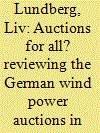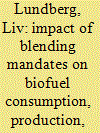|
|
|
Sort Order |
|
|
|
Items / Page
|
|
|
|
|
|
|
| Srl | Item |
| 1 |
ID:
166354


|
|
|
|
|
| Summary/Abstract |
In 2017, Germany introduced auctions to determine the support level for onshore wind power. To protect small-scale actors, citizens’ energy cooperatives were allowed longer realization periods and did not need to have an approval pursuant to the Federal Immission Control Act to submit a bid. Winning cooperatives were given the highest accepted bid, while other participants were paid-as-bid. The aim of this paper is to examine how this auction design affected actor diversity and the risk of winning projects not being realized. Unexpectedly, the outcome of the auctions was that over 90% of the winners were cooperatives, and the average project size of their bids was twice the size of other winning bids. There was also a significant decrease in the highest accepted bid, from 5.78€ct/kWh in the first auction, to 3.82€ct/kWh in the third auction. However, the pricing rule combined with uncertain technology costs and strong competition, may have encouraged overly aggressive bidding. This, as well as cooperatives being exempt from having an approval pursuant to the Federal Immission Control Act, could increase the risk of winning projects not being realized. A conclusion is that special rules for small-scale actors, should be used with caution, especially if they give significant competitive advantages and may affect realization rates.
|
|
|
|
|
|
|
|
|
|
|
|
|
|
|
|
| 2 |
ID:
192774


|
|
|
|
|
| Summary/Abstract |
The transport sector accounts for about 20% of EU's GHG-emissions. Progress in emission reductions has been slow and primarily driven by biofuels promoted through national blending mandates. The mandates differ in whether they are measured in volume, energy, or emission reduction and in how gasoline and diesel are targeted. Due to this, national mandates and their effects have not previously been quantitatively compared on an EU level. In this article we convert the mandates for all EU member states between 2009 and 2020 to a common unit and study their impact on biofuel consumption, production, emission reductions and fuel prices. We find that mandates are driving biofuel consumption in the EU and correlates with emission reductions. Increased mandates have however often been fulfilled by blending biofuels eligible for double counting. We also find that reduction mandates have been effective in encouraging high-performance biofuels. For historical fuel prices, we do not see a clear correlation between countries' shares of biofuel and consumer fuel prices while the global oil price has a considerable impact. For biofuel production, increased demand drive investments in the EU, but when it comes to localisation of new plants factors such as local infrastructure are more important than national mandates.
|
|
|
|
|
|
|
|
|
|
|
|
|
|
|
|
|
|
|
|
|